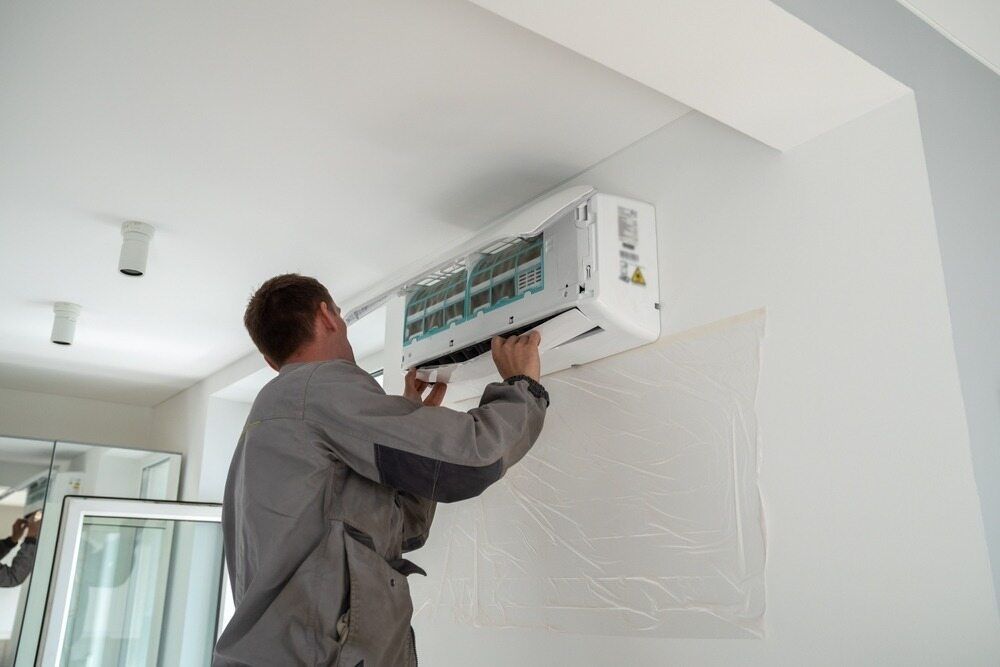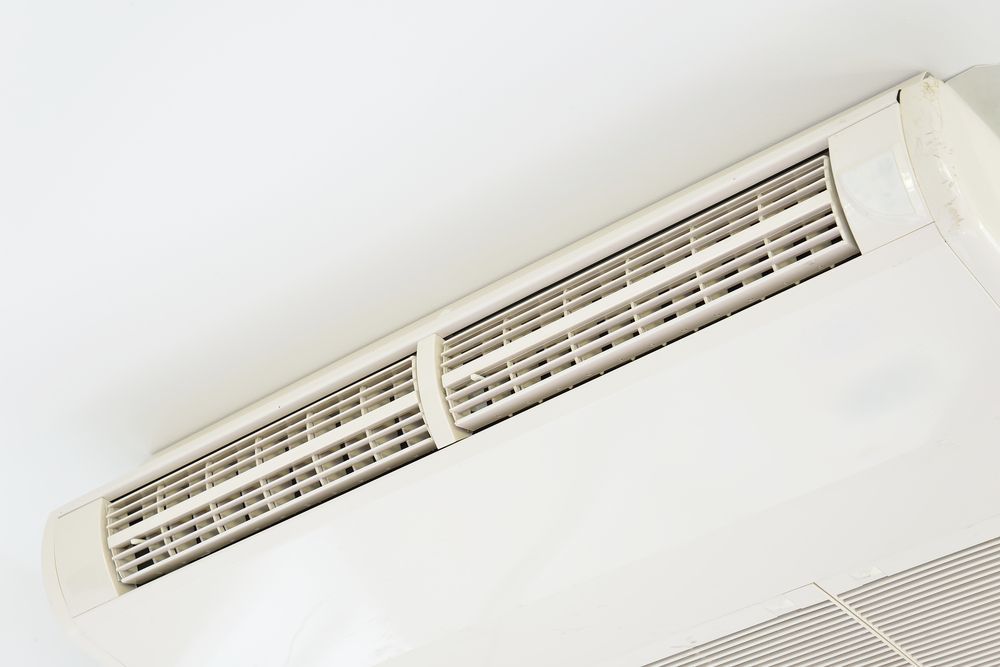Understanding whether to repair or replace an air conditioner can be confusing for homeowners. With the myriad of factors to consider, it's important to make an informed decision that not only ensures comfort but also maximises energy efficiency.
According to the Department of Climate Change, Energy, the Environment and Water, heating and cooling can account for 20% to 50% of the energy used in Australian homes. This highlights the significance of maintaining a properly functioning air conditioner to reduce energy consumption.
This guide aims to provide clarity on the decision-making process by exploring common questions and concerns that homeowners have when faced with the choice of repairing or replacing their air conditioner.
When Is It Worth Repairing an Air Conditioner?
When considering whether to repair an air conditioner, one crucial factor is the cost comparison with replacement. If the repair costs are significantly lower than the cost of a new unit, it may be worth investing in repairs to extend the lifespan of the existing air conditioner.
Frequent breakdowns and repairs can also indicate the need for a replacement. If your air conditioner has required multiple repairs in a short period, it may be more cost-effective to invest in a new, more reliable unit. Additionally, the age of the air conditioner plays a significant role in the repair versus replace decision.
Energy efficiency shouldn't be overlooked when deciding whether to repair or replace an air conditioner. Newer models are often more energy-efficient, which can lead to long-term savings on energy bills. If your current unit is outdated and inefficient, it may be beneficial to upgrade to a more eco-friendly model.
How Can I Identify When an Air Conditioner Needs Replacing?
Signs of irreversible damage, such as compressor failure or leaking refrigerant, may indicate that it's time to replace your air conditioner. In such cases, repairs may only provide a temporary solution, and a new unit may be a more cost-effective long-term investment.
If your air conditioner consistently fails to cool your home adequately, it may be time for a replacement. This could signal underlying issues that are beyond repair, and a new unit with better performance capabilities may be necessary to maintain a comfortable indoor environment.
A spike in energy bills without a corresponding increase in usage can be a sign that your air conditioner is no longer operating efficiently. Newer models are designed to be more energy-efficient, so upgrading to a newer unit could help lower your energy costs in the long run.
What Maintenance Can Prevent Frequent Air Conditioner Repairs?
Regularly changing air filters is a simple yet effective way to prevent common air conditioner issues. Clogged filters restrict airflow and can lead to system malfunctions. By replacing filters as recommended by the manufacturer, you can ensure your unit operates efficiently.
Scheduling professional maintenance checks on your air conditioner can help identify potential problems before they escalate. HVAC technicians have the expertise to inspect your unit, clean components and perform necessary adjustments to keep your air conditioner running smoothly. Regular maintenance can prolong the lifespan of your unit and reduce the need for costly repairs.
Keeping the coils of your air conditioner clean is essential for optimal performance. Dust and debris can accumulate on the coils, hindering heat transfer and forcing the system to work harder. Regularly cleaning the coils can improve efficiency and prevent unnecessary strain on the unit.
How Do I Choose the Right Replacement Air Conditioner?
When selecting a replacement air conditioner, analysing energy efficiency ratings is crucial. Look for units with high energy ratings, as they're more energy-efficient and can help lower your electricity bills. Energy-efficient models also have a reduced environmental impact.
Understanding the different types of air conditioners available can help you make an informed decision. Whether you opt for a central air system, ductless mini-split or window unit, consider factors such as your home's layout, insulation and cooling requirements. Consulting with an HVAC professional can help determine which type of unit is best suited for your home.
Room size and capacity requirements are important considerations when choosing a replacement air conditioner. Select a unit that can adequately cool the space without being oversized, as this can lead to inefficiency and uneven temperatures. Proper sizing ensures optimal performance and energy savings.
What Are the Financial Implications of Replacing an Air Conditioner?
Comparing the initial cost of a new air conditioner with the long-term savings it can provide is essential. While the upfront investment may seem significant, energy-efficient models can help lower your monthly energy bills, leading to savings over time. Consider the return on investment when deciding whether to replace your air conditioner.
There may be potential rebates and incentives available for upgrading to a more energy-efficient air conditioner. Research government programs, utility company incentives and manufacturer rebates that could offset the cost of purchasing a new unit. Taking advantage of these financial incentives can make replacing your air conditioner more affordable.
Financing options and payment plans are available for homeowners who may not have the funds upfront to purchase a new air conditioner. Many HVAC companies offer financing options that allow you to spread out the cost of the unit over time. Compare different financing plans to find one that fits your budget and financial goals.
What Are Common Misconceptions About Air Conditioner Replacement?
A common misconception is that newer is always better when it comes to air conditioners. While newer models may offer improved efficiency and performance, it's important to consider factors such as sizing, maintenance requirements and overall cost-effectiveness before replacing your unit.
Another misconception is that all air conditioner units are the same. In reality, different models have unique features, capacities and efficiency ratings. Choosing the right unit for your home involves considering factors such as climate, square footage and insulation levels to ensure optimal performance.
Some homeowners believe that DIY air conditioner replacements save money. However, improper installation can lead to inefficiency, performance issues and even safety hazards. It's best to hire a professional HVAC technician to install your new air conditioner to ensure it operates correctly and efficiently.
Knowing when to repair or replace your air conditioner is crucial for maintaining indoor comfort and maximising energy efficiency. Air conditioner replacement is an important decision that can impact both your comfort and your utility bills. Older units often become inefficient and prone to frequent breakdowns. Replacing an outdated system with a modern, energy-efficient model can significantly reduce energy consumption and maintenance costs. New air conditioners come equipped with features such as variable-speed compressors, smart thermostats and improved air filtration, offering better climate control and indoor air quality.
When choosing a replacement, it’s essential to consider your home’s size, insulation and climate to ensure the system is properly sized and efficient. Hiring a licensed HVAC professional ensures correct installation and compliance with current standards and regulations. Though the initial investment can be substantial, the long-term savings in energy costs and the improvement in comfort make air conditioner replacement a worthwhile upgrade for most homeowners. It’s a smart step toward a more sustainable home.
By considering factors such as repair costs, energy efficiency and maintenance, homeowners can make informed decisions that enhance the longevity and performance of their air conditioning systems. Reach out to Denali Air Conditioning to see if we can help repair or replace your unit!



